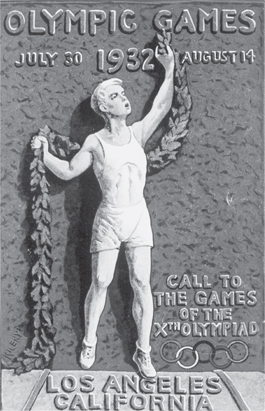
LOS ANGELES BIDS FOR
THE GAMES
Bidding to host the Olympic Games is in Los Angeles’s blood. Shortly after the successful Los Angeles 1932 Games, the IOC (through IOC member and American Olympic Association president Avery Brundage) approached the leadership in Los Angeles with the possibility that the 1940 Games, then scheduled for Tokyo, might have to be moved because of the spreading war in Asia. Angelenos responded immediately by offering to stage the Games in Los Angeles and by establishing a new organization, the Southern California Committee for the Olympic Games (the Southern California Committee or SCCOG) to focus their efforts. As the international situation worsened, the 1940 Games were cancelled, but the Southern California Committee became the nation’s first and only independent organization devoted to both bidding for the Games and advancing the Olympic movement in general.
Year after year, the Southern California Committee supported the American Olympic team by fundraising and by its annual track-and-field meet. It nurtured relationships with the members of the IOC and began bidding for the Games as soon as the war was over. Mayor after mayor joined with the committee to bid for each quadrennial award. At first, Los Angeles bid directly to the IOC. After the 1956 bids, the rules changed so that the USOC would select one American city to bid each time. For four successive bids, it chose Detroit over Los Angeles as its standard bearer. Detroit was the home of USOC president Doug Roby. For 1976, it finally turned to Los Angeles with a bid that proposed to finance the Games through the sale of television rights. Nevertheless, Montreal was selected by the IOC. Los Angeles tried again for 1980, but Moscow won.
In May 1978, following the financial debacle of the Montreal 1976 Games, Los Angeles was the only bidder for 1984 (after Teheran failed to bid due to its revolution). Los Angeles offered to stage the event under a private organizing committee, financed by privately raised funds, and using the area’s wealth of existing facilities—a “Spartan” approach. The IOC reluctantly and conditionally awarded the Games to Los Angeles while insisting on a government guarantee against a deficit. Los Angeles and its population resisted the pressure for taxpayer funding and struggled with the IOC until a guarantee by the USOC sealed the deal in late 1978. The Games would return to Los Angeles.

The inspiration for the 1984 Games arose from the successful Games of the Xth Olympiad, held in Los Angeles in 1932. Those Games invented the Olympic Village. They earned a financial surplus of $1 million in the depths of the Depression, put Los Angeles on the international sports map, and gave birth to the Southern California Committee to support the Olympic movement and to return the Games to Los Angeles.
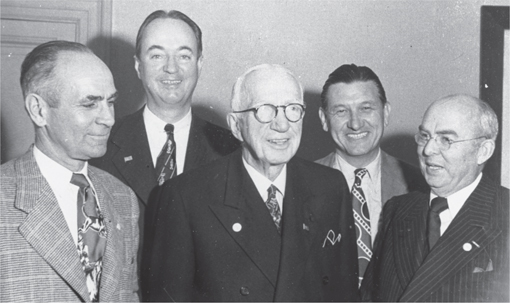
The Southern California Committee bid at every opportunity. Here is its delegation to the IOC meeting in Stockholm in 1947 in pursuit of the 1952 Games. From left to right are Ralph Chick, John Jewett Garland, William May Garland, Frank Bull, and chairman Paul H. Helms. (Courtesy SCCOG.)
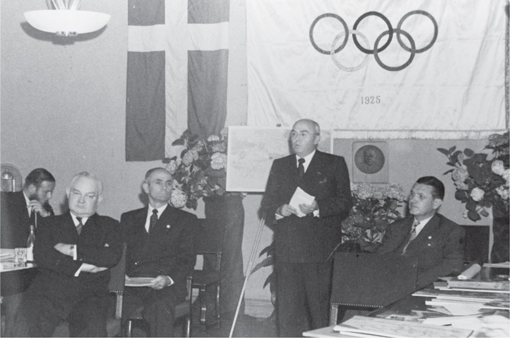
Southern California Committee chairman Paul Helms stated Los Angeles’s case for the 1952 Games to the IOC. With him, from left to right, were Mayor Fletcher Bowron, Ralph Chick, and Frank Bull. The IOC awarded the Games to Helsinki. Los Angeles tried for 1956, too, but Melbourne won. (Courtesy SCCOG.)
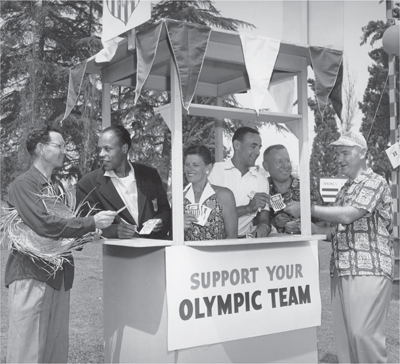
Between bids, the Southern California Committee worked steadily to raise funds for the US Olympic team. The American team remains unique in having no government funding. (Courtesy SCCOG.)
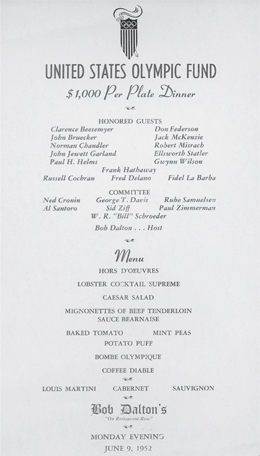
Fundraising for the team included this 1952 $1,000-per-plate dinner. In today’s climate, it would be unlikely to include “Bombe Olympique” on an Olympic menu. (Courtesy SCCOG.)
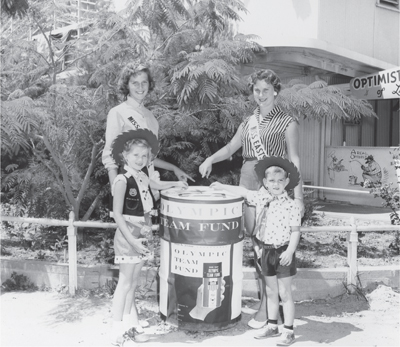
Even youngsters and local beauty queens were enlisted in the fundraising efforts throughout the 1950s and 1960s. (Courtesy SCCOG.)
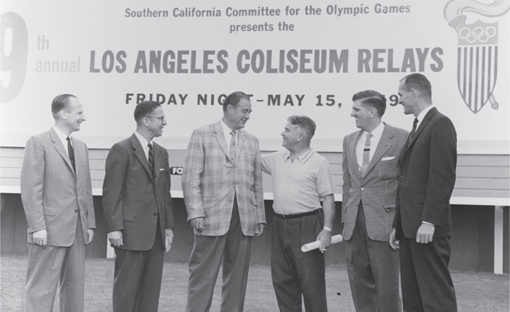
From 1941 to 1969, the Southern California Committee hosted the Coliseum Relays track meet at the Coliseum. It continued as the Compton Relays until 1972. Here the 1959 organizers are gathered. (Courtesy SCCOG.)
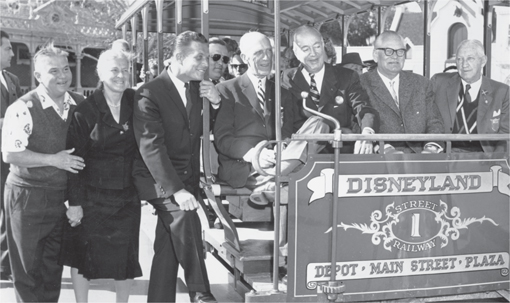
The Southern California Committee was instrumental in bringing the Olympic Winter Games to Squaw Valley, California, in 1960, and encouraged IOC members visit the Los Angeles area as well. Here Southern California Committee leader (and honorary president of the Squaw Valley Games) John Jewett Garland takes fellow IOC members on a tour of Disneyland in February 1960. Garland also led Los Angeles’s bid to the USOC for the 1976 Games. (Courtesy SCCOG.)
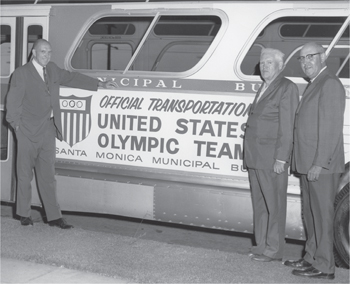
In September 1964, as the American athletes traveled to Los Angeles en route to the Tokyo Games, Los Angeles established a Welcome Committee that provided bus transportation, a football game at the Coliseum, a visit to Disneyland, and a banquet with Mayor Sam Yorty. From left to right are Coliseum general manager William Nicholas with committee members James Kelley and Hilmer Lodge. (Courtesy SCCOG.)
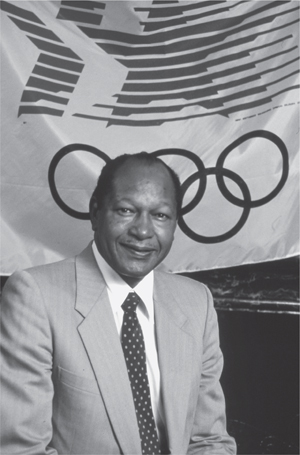
Tom Bradley, Los Angeles’s mayor from 1973 to 1993, picked up the Olympic baton from his predecessor, Sam Yorty, who had led an abortive run in 1969 as the American candidate city for the 1976 Games. Those Games went to Montreal. Bradley teamed with the Southern California Committee’s John Argue to make a bid for the 1980 Games. When Moscow was selected, he redoubled his efforts toward 1984. (Photograph by Elisa Leonelli.)
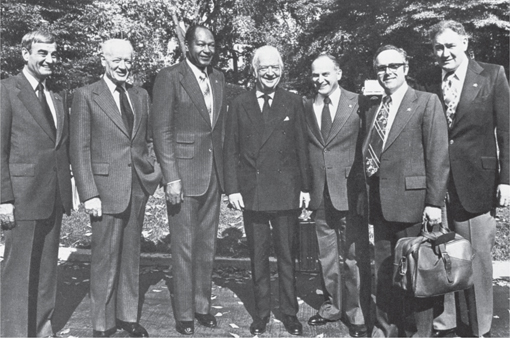
Los Angeles’s team traveled to Athens in May 1978 to present its bid for the 1984 Games to the IOC. It was the only bid the IOC received, and Los Angeles was conditionally chosen. From left to right are USOC executive director Col. F. Donald Miller and Pres. Robert Kane; Mayor Tom Bradley; IOC president Lord Killanin; Southern California Committee chair John Argue; Los Angeles chief administrative officer Anton Calleia; and city council president John Ferraro. (Courtesy SCCOG.)
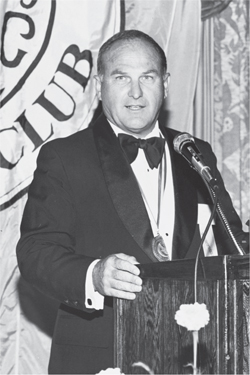
John C. Argue, chair of the Southern California Committee from 1972 to 2002, led the bid effort for Los Angeles. The bid proposed private-sector financing and no government guarantees, despite contrary IOC requirements. After attempts to reach a final agreement with the IOC failed in summer 1978, Argue joined with six other private-sector representatives in a new negotiating committee that called itself the Los Angeles Olympic Organizing Committee (LAOOC). That “blue ribbon committee” pursued the negotiations to success in October 1978. Later, Argue was bestowed the IOC’s highest honor, the Olympic Order (as was Peter V. Ueberroth). (Courtesy SCCOG.)
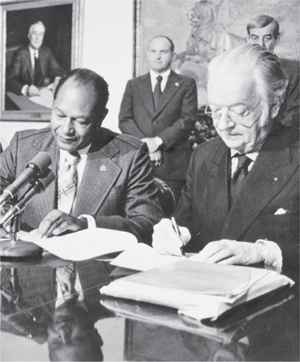
On October 20, 1978, at the White House, Mayor Bradley and IOC president Killanin signed the host city agreement under the gaze of John Argue of the Southern California Committee and Don Miller of the USOC. A final contract with the IOC was signed on March 1, 1979, in Lausanne, Switzerland. (Courtesy SCCOG.)
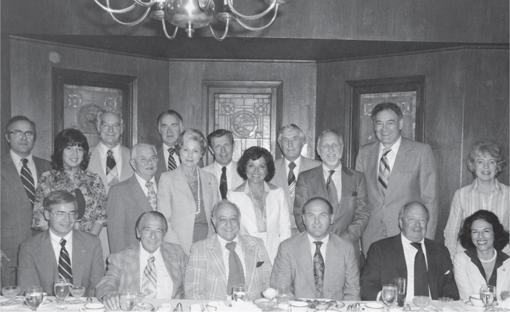
On October 21, 1978, LAOOC returned home to a jubilant community and a victory lunch at the Los Angeles Athletic Club. LAOOC members present at the lunch were (sitting) John Argue (fourth from left); (standing) Rodney Rood (fifth from left); William Robertson (ninth from left); and David Wolper (tenth from left). The remaining members, Howard Allen, Justin Dart, and Paul Ziffren were absent. LAOOC then restructured and expanded in order to organize the Games. (Courtesy SCCCOG.)